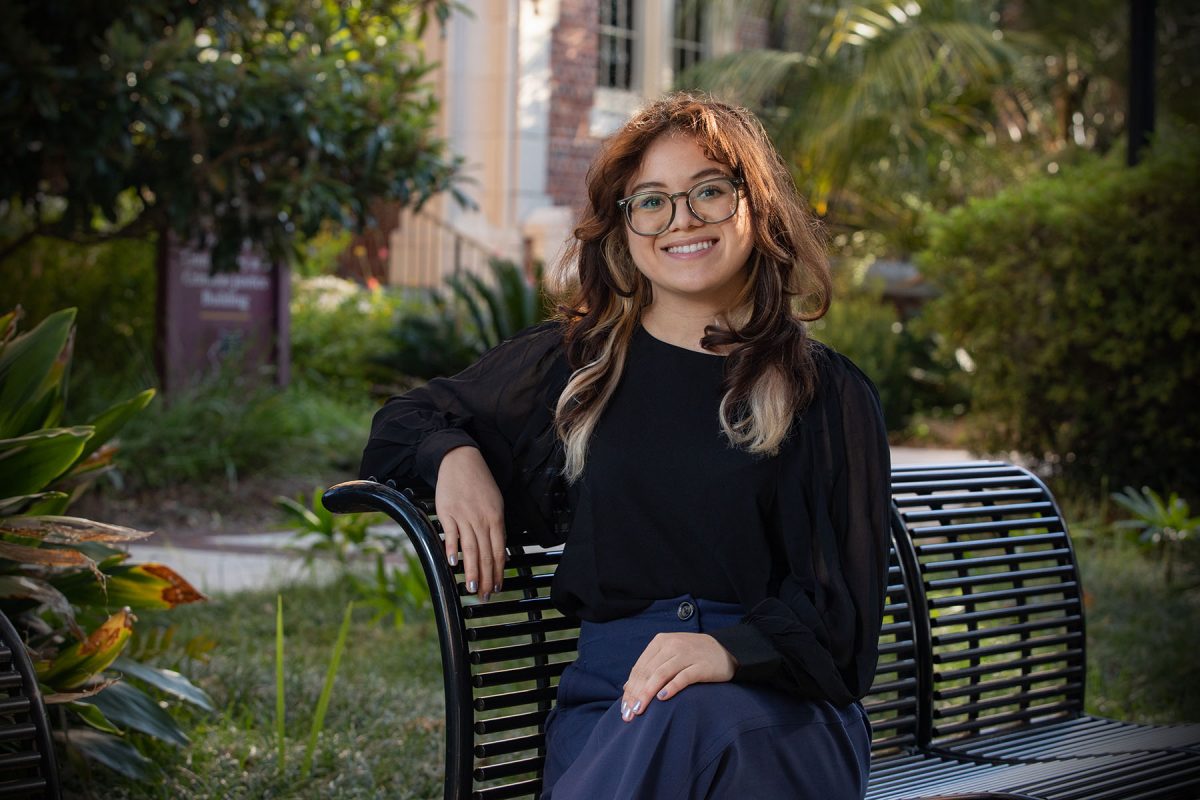
“FSU has not only equipped me with the necessary resources and support to delve deeper into environmental research but also the opportunity to engage with the community and share my insights on environmental issues.”
Fast Facts
- Bilingual: Speaks English and Spanish
- Mastering the Depths: A certified rescue diver
- STEM: Part of FSU’s Women in Math, Science and Engineering
- Exploring the Outdoors: Led trips to the Great Smoky Mountains as a trip leader for Outdoor Pursuits
- Food Lover: Loves to cook and try new recipes from The New York Times or different cookbooks
Being a steward of the environment has always been important to senior Andrea Emmanuelli. To help combat climate change, she decided to pursue a degree in geology at Florida State University.
From a young age, Emmanuelli understood that our actions affect the environment around us. When she learned about the decline of Florida’s coral reefs and the frequent occurrence of red tide, she committed her life to protecting the health and wellness of people, wildlife and the environment.
To make an impact during her studies, Emmanuelli joined the lab of Angie Knapp, associate professor of oceanography and environmental science in the Department of Earth, Ocean and Atmospheric Science.
“Working in the Knapp Lab gave me some context for how oceanographic research is done and how measurements can give us clues to what biological and chemical processes are going on in the ocean,” Emmanuelli said.
Last summer, she continued her research with Knapp’s National Oceanic and Atmospheric Administration research project, where she spent three weeks collecting water samples along the Gulf of Alaska, fjords in Glacier Bay National Park, and the channels of Southeast Alaska.
When she returned to campus, Emmanuelli utilized these samples to analyze nitrate and nutrient concentration in the water, which yielded significant discoveries for her Honors in the Major thesis project, specifically regarding the source of nutrients in Alaskan water.
“This information is important for Alaskan fisheries because macronutrients, such as bioavailable nitrogen in surface waters, often limit primary production in an ecosystem and can fuel harmful algal blooms,” Emmanuelli said. “Because both of these phenomena affect fisheries, they can have an impact on the local communities and the Alaskan economy.”
Emmanuelli’s love for the environment extends beyond the classroom and laboratory. Through FSU’s Outdoor Pursuits and Climbing Club, she shares her love for the environment with other students by teaching the Leave-No-Trace principles, a framework of low-impact practices for visiting the outdoors.
“It is exciting for me to be a positive and supportive resource for them,” Emmanuelli said. “I aim to empower people to participate in outdoor activities and feel confident in their abilities.”
To continue her studies, Emmanuelli plans to pursue a doctoral degree in chemical oceanography.
What inspired you to become so passionate about the environment?
I went scuba diving with my dad, and he spoke about how the reefs looked different from when he was younger. As I began to dive myself, I also noticed the decline in reef health, particularly in the Florida Keys. While I was aware of climate change, I didn’t fully comprehend it at the time. I wanted to learn more about Earth and our oceans and understand how we can play a role in preserving the environment.
Who at FSU has made the biggest impact on you?
Angie Knapp has been an incredible mentor for me since the day I joined her lab. Her mentorship and guidance have been instrumental in my growth as a student and researcher. She has provided me with countless opportunities and tools to enhance my skills and knowledge. Her encouragement has also been a great motivation for me to strive for excellence.
Could you go more into depth about what you did during your three weeks at sea?
We sampled off the continental shelf, in the interior passages of Southeast Alaska, and the fjords of Glacier Bay National Park. I was responsible for logging, collecting, filtering and labeling nutrient samples according to various protocols during recovery. During the expedition, I collected 96 samples to return to the Knapp Lab at FSU to measure the nitrogen and oxygen isotopic composition of nitrate in samples collected near the coast and fjords.
How has your experience as a Campus Recreation Outdoor Pursuits Trip Leader helped you become a better steward to the environment?
As a trip leader, I have had the privilege of sharing my love for the environment with students from diverse academic and personal backgrounds. I strongly believe in experiential learning, where participants gain knowledge about the natural world by exploring various environments. On our trips, we always prioritize discussing the seven Leave-No-Trace principles, which provide a clear framework for minimizing our impact while enjoying the great outdoors. I am excited that I have the experience of teaching these skills and can bring this knowledge to future classes that I may teach.
What have you learned from your leadership experience with Outdoor Pursuits?
Through my previous positions, I have developed my interpersonal skills significantly. These roles have helped me gain more empathy for others, self-awareness and self-confidence. I have been able to assist individuals in experiencing the great outdoors and overcoming their discomforts. I consider it a privilege to take people backpacking, kayaking, rafting, etc., as part of my job. However, I’ve also learned that it comes with a huge responsibility in terms of safety and being a steward of the environment.




